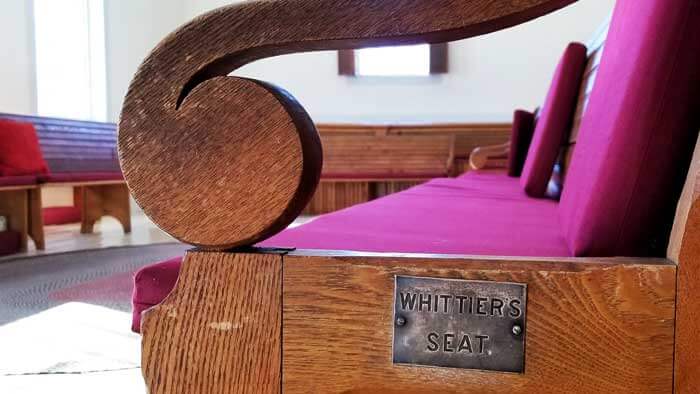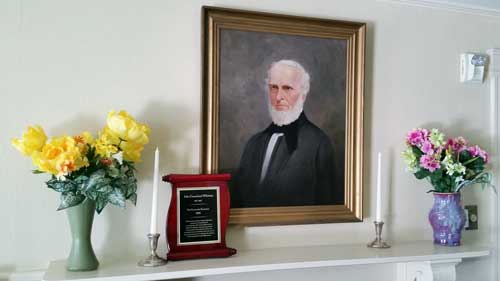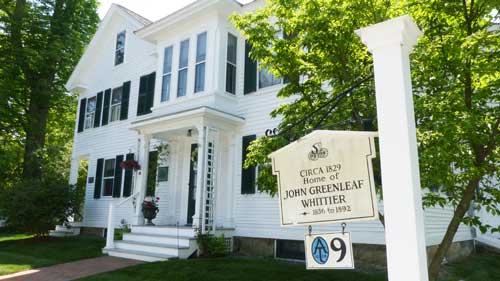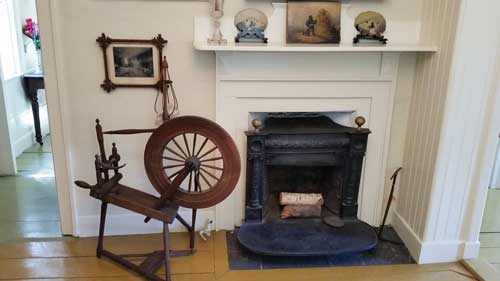JOHN GREENLEAF WHITTIER

This plaque on the end pew commemorates the poet and abolitionist John Greenleaf Whittier. He was a member and Clerk of the Building Committee that supervised the 1851 construction of our Meetinghouse.
In 1882 John Greenleaf Whittier wrote a letter containing this autobiography.
Amesbury, 5th Mo., 1882
Dear Friend:
I am asked in thy note of this morning to give some account of my life. There is very little to give.
I can say with Canning’s knife-grinder: “Story, God bless you! I have none to tell you!”
I was born on the 17th of December, 1807, in the easterly part of Haverhill, MA, in the house built by my first American ancestor, two hundred years ago. My father was a farmer, in moderate circumstances,-a man of good natural ability, and sound judgment. For a great many years he was one of the Selectmen of the town, and was often called upon to act as arbitrator in matters at issue between neighbors. My mother was Abigail Hussey, of Rollinsford, NH. A bachelor uncle and a maiden aunt, both of whom I remember with much affection, lived in the family. The farm was not a very profitable one; it was burdened with debt and we had no spare money; but with strict economy we lived comfortably and respectably. Both my parents were members of the Society of Friends. I had a brother and two sisters. Our home was somewhat lonely, half hidden in oak woods, with no house in sight, and we had few companions of our age, and few occasions of recreation. Our school was only for twelve weeks in a year,- in the depth of winter, and half a mile distant. At an early age I was set at work on the farm, and doing errands for my mother, who, in addition to her ordinary house duties, was busy in spinning and weaving the linen and woolen cloth needed in the family.
On First-days, father and mother, and sometimes one of the children, rode down to the Friends’ Meeting-house in Amesbury, eight miles distant. I think I rather enjoyed staying at home and wandering in the woods, or climbing Job’s hill, which rose abruptly from the brook which rippled down at the foot of our garden. From the top of the hill I could see the blue outline of the Deerfield mountains in New Hampshire, and the solitary peak of Agamenticus on the coast of Maine. A curving line of morning mist marked the course of the Merrimac, and Great Pond, or Kenoza, stretched away from the foot of the hill towards the village of Haverhill hidden from sight by intervening hills and woods, but which sent to us the sound of its two church bells. We had only about twenty volumes of books, most of them the journals of pioneer ministers in our society. Our only annual was an almanac. I was early fond of reading, and now and then heard of a book of biography or travel, and walked miles to borrow it.
When I was fourteen years old my first school-master, Joshua Coffin, the able, eccentric historian of Newbury, brought with him to our house a volume of Burns’ poems, from which he read, greatly to my delight. I begged him to leave the book with me; and set myself at once to the task of mastering the glossary of the Scottish dialect at its close.
This was about the first poetry I had ever read, (with the exception of that of the Bible, of which I had been a close student,) and it had a lasting influence upon me I began to make rhymes myself, and to imagine stories and adventures. In fact I lived a sort of dual life, and in a world of fancy, as well as in the world of plain matter-of-fact about me. My father always had a weekly newspaper, and when young Garrison started his “Free Press”. at Newburyport, he took it in the place of the “Haverhill Gazette.” My sister, who was two years older than myself, sent one of my poetical attempts to the editor. Some weeks afterwards the news-carrier came along on horse-back and threw the paper out from his saddle-bags. My uncle and I were mending fences. I took up the sheet, and was surprised and overjoyed to see my lines in the “Poet’s Corner.” I stood gazing at them in wonder, and my uncle had to call me several times to my work before I could recover myself. Soon after, Garrison came to our farm-house, and I was called in from hoeing in the corn-field to see him. He encouraged me, and urged my father to send me to school. I longed for education, but the means to procure it were wanting. Luckily, the young man who worked for us on the farm in summer, eked out his small income by making ladies’ shoes and slippers in the winter; and I learned enough of him to earn a sum sufficient to carry me through a term of six months in the HaverhillAcademy. The next winter I ventured upon another expedient for raising money, and kept a district school in the adjoining town of Amesbury, thereby enabling me to have another academy term. The next winter I spent in Boston, writing for a paper. Returning in the spring, while at work on the farm, I was surprised by an invitation to take charge of the Hartford (CT) “Review,” in the place of the famous George D. Prentice, who had removed to Kentucky. I had sent him some of my school “compositions,” which he had received favorably. I was unwilling to lose the chance of doing something more in accordance with my taste, and, though I felt my unfitness for the place, I accepted it, and remained nearly two years, when I was called home by the illness of my father, who died soon after. I then took charge of the farm, and worked hard to “make both ends meet;” and, aided by my mother’s and sister’s thrift and economy, in some succeeded.
As a member of the Society of Friends, I had been educated to regard Slavery as a great and dangerous evil, and my sympathies were strongly enlisted for the oppressed slaves by my intimate acquaintance with William Lloyd Garrison. When the latter started his paper in Vermont, in 1828, I wrote him a letter commending his views upon Slavery, Intemperance and War, and assuring him that he was destined to do great things. In 1833, I was a delegate to the first National Anti-Slavery Convention, at Philadelphia. I was one of the Secretaries of the Convention and signed its Declaration. In 1833, I was in the Massachusetts Legislature. I was mobbed in Concord, NH, in company with George Thompson, afterwards member of the British Parliament, and narrowly escaped from great danger. I kept Thompson, whose life was hunted for, concealed in our lonely farm-house for two weeks. I was in Boston during the great mob in Washington Street, soon after, and was threatened with personal violence. In 1837, I was in New York, in conjunction with Henry B. Stanton and Theodore D. Weld, in the office of the American Anti-Slavery Society. The next year I took charge of the “Pennsylvania Freeman,” an organ of the Anti-Slavery Society. My office was sacked and burned by a mob soon after, but I continued my paper until my health failed, when I returned to Massachusetts. The farm in Haverhill had, in the meantime, been sold, and my mother, aunt and youngest sister, had moved to Amesbury, near the Friends’ Meeting-house, and I took up my residence with them. All this time I had been actively engaged in writing for the anti-slavery cause. In 1833, I printed at my own expense, an edition of my first pamphlet, “Justice and Expediency.” With the exception of a few dollars from the “Democratic Review” and “Buckingham’s Magazine,” I received nothing for my poems and literary articles. Indeed, my pronounced views on Slavery made my name too unpopular for a publisher’s uses. I edited in “The Middlesex Standard,” and afterwards became associate editor of the “National Era,” at Washington. I early saw the necessity of separate political action on the part of Abolitionists and was one of the founders of the Liberty Party-the germ of the present Republican Party.
In 1837,1864; and in 1863, “Snow Bound.” In 1860, I was chosen a member of the Electoral College of Massachusetts, and also in I have been a member of the Board of Overseers of Harvard College, and a Trustee of Brown University. But while feeling, and willing to meet, all the responsibilities of citizenship, and deeply interested in questions which concern the welfare and honor of the country, I have, as a rule, declined overtures for acceptance of public stations. I have always taken an active part in elections, but have not been willing to add my own example to the greed of office.
I have been a member of the Society of Friends by birth-right, and by a settled conviction of the truth of its principles and the importance of its testimonies, while, at the same time, I have a kind feeling towards all who are seeking, in different ways from mine, to serve God and benefit their fellow-men. Neither of my sisters are living. My dear mother, to whom I own much every way, died in My brother is still living, in the city of Boston. My niece, his daughter, who was with me for some years, is now the wife of S. T. Pickard, Esq., of Portland, Maine. Since she left me I have spent much of my time with esteemed relatives at Oak Knoll, Danvers, MA, though I still keep my homestead at Amesbury, where I am a voter.
My health was never robust; I inherited from both my parents a sensitive, nervous temperament; and one of my earliest recollections is of pain in the head, from which I have suffered all my life. For many years I have not been able to read or write for more than half an hour at a time; often not so long. Of late, my hearing has been defective. But in many ways I have been blest far beyond my deserving; and, grateful to the Divine Providence. I tranquilly await the close of a life which has been longer, and on the whole happier, than I had reason to expect, although far different from that which I dreamed of in youth. My experience confirms the words of old time, that “it is not in man who walketh to direct his steps.” Claiming no exemption from the sins and follies of our common humanity, I dare not complain of their inevitable penalties. I have had to learn renunciation and submission, and “Knowing that kindly Providence its care is showing in the withdrawal as in the bestowing, Scarcely I dare for more or less to pray.”
Thy friend,
JOHN G. WHITTIER



